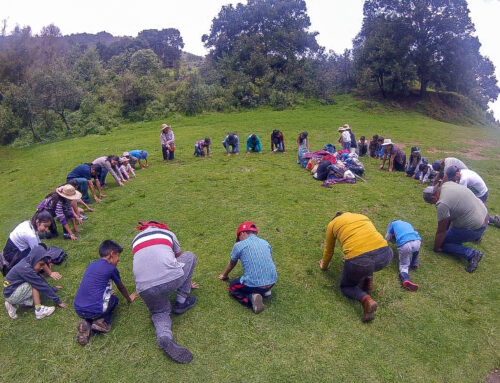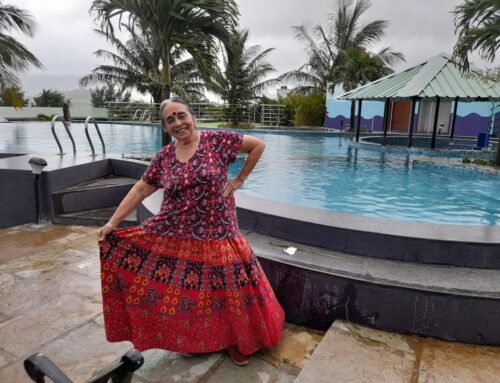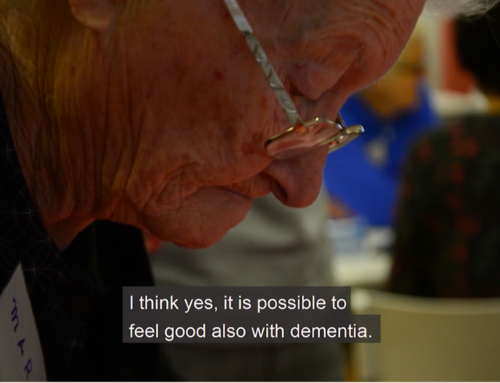Fidelis Soares (not his real name) worked as a healthcare nurse at a community health center situated on the outskirts of Kupang, Indonesia. He oversaw the day clinic for senior citizens known as the Lansia clinic, named after the Indonesian abbreviation for “people with advanced age” or orang lajut usia. Originally from Timor-Leste (formerly East Timor), Fidelis was among the hundreds of thousands displaced to Kupang, West Timor, Indonesia, after the violent 1999 independence referendum. Like many East Timorese civil servants during the Indonesian occupation, he chose to remain in Indonesia, primarily to secure his civil service position and pension. In addition to his duties at the center, Fidelis provided outreach healthcare services for the older population in the region, particularly for the minoritized East Timorese diaspora.
When I first came to visit his clinic, Fidelis was consulting a patient. The door was wide open, revealing a thinly framed older woman in a floral kebaya blouse, accompanied by her grandson, attentively listening to Fidelis’s instructions. Though out of view, his loud and authoritative voice permeated through the noisy clinic, “Nenek (grandmother in Bahasa Indonesia), you should avoid eating spicy food. That’s what’s causing the stomach cramps. Take this medicine for the nausea.” Fidelis then turned to the adult grandson and said, “buy your grandmother meat once in a while, and bring her here every month for checkups so she can stay strong!”
After they left, Fidelis called out, “Next!” No one else was waiting except for me. I quickly rose to enter his consultation room. Peeking in, I smiled, “May I come in?”
Sitting across from me was a portly man, appearing to be in his mid-fifties, with salt-and-pepper short curls. His eyes were round and almost as dark as his thick black brows. I quickly introduced myself, explaining that I was conducting research about aging and displacement. He greeted me with a surprised expression, but he showed that he indeed was expecting my visit. “Ah, yes! My colleagues have told me about you. They said that you wanted to speak with me?” Fidelis rose to shake my hand. He stood tall in his white, crisp uniform, which fit snugly around his ample midsection. I answered politely while taking the seat he had offered, “yes, I wanted to see if I could possibly learn about your work.”
Fidelis smiled and leaned back on his chair. He held both his hands behind his head, swaying back and forth in his chair. “What do you want to know?” Before I even answered, he glanced at his watch and said, “I will let you come with me and you can see for yourself!”
Fidelis first showed me the posters that decorated his consultation room. These were infographics of the Indonesian government’s nationwide plan promoting “healthy aging.” He explained that while there are now dedicated clinics for older people across the province, not all provide equal care. Some clinics, like his, he said, are more caring, while others are less. “Families don’t bring their elders for check-ups, and the older people themselves don’t come until they are too sick. That’s why we do monthly outreach visits to community centers, similar to what clinics for mother and child health do.” Knowing that other Lansia clinics also provide monthly outreach programs, I asked what he meant by “more caring.” Fidelis responded:
Well, as you might know, I am originally from East Timor. There are lots of East Timorese people here, displaced since 1999. Many of them are already in their old age. Some don’t have their children with them. They wouldn’t come to clinics like this, not even to the outreach activities. They have no land and live in poverty. So, I care for them as if they were my own mothers and fathers.
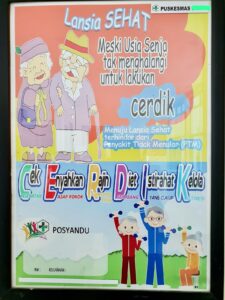
The Lansia clinic in Kupang, Indonesia. Photo by the author.
East Timorese communities in Kupang and other resettlement areas in West Timor frequently encounter socioeconomic hardships due to prejudice and discrimination. As agricultural farmers in their origin country, these refugees-turned-residents often face conflicts over land use following the loss of their land caused by displacement. Furthermore, their typically segregated settlements and the negative sentiment towards former East Timorese militia members, based on their violent history during the conflict, exacerbate their experiences of social exclusion. Fidelis described these reasons for his commitment to the older people’s clinic. “In other areas, Lansia clinics don’t consider the needs of minoritized groups like the East Timorese. It is my goal to take care of my people,” he said.
In order to shadow his activities, I needed permission from the head of the community health center (Puskesmas). With my collaboration request letter in hand, Fidelis accompanied me to her office for the introduction. As we approached the door, I noticed a shift in his demeanor. His initial confidence waned, and he shrunk his posture while knocking. When the voice in the office answered with a sharp tone, “Yes?” Fidelis entered the room, “It’s me, Doctor…” His authoritative voice from earlier softened to almost a whisper, and he kept his head down. The head doctor, visibly younger, spoke with superiority, and they continued their conversation with this dynamic.
During my collaboration with Fidelis between 2019 and 2022, observing his work and interactions with patients at the health center and during home visits to older East Timorese individuals, I noticed these frequent shifts in his demeanor. It appeared as though there were two versions of Fidelis in work situations: the confident and authoritative professional who arrived as a refugee to become a respected nurse with a stable income, and the more “submissive” or “conflict-avoidant” East Timorese individual working alongside their non-East Timorese colleagues. For Fidelis, giving back to both his own community and the host society was crucial in pursuing his goal. To support his cause, he had to continuously navigate his position and self-representation, in ways similar to what the literature in refugee studies describe through the concept of the “good refugee” (Hetz 2021).
The older East Timorese patients Fidelis visited often felt that healthcare programs were designed for local communities, not for them. Despite living in West Timor for over twenty years, narratives of unequal distribution of care, including healthcare and household financial aid, were common in my interviews with older research participants. While they emphasize their deservingness of equal treatment, a sense of exclusion persists. In response, Fidelis prioritized spending time with his East Timorese patients, aiming to uplift their spirits as they had endured painful experiences and needed support. During home visits, he routinely monitored his patients’ blood pressure, weight, and medical history, and prescribed medicine as needed. With these prescriptions, the patients could get the medications for free at the Puskesmas. Before leaving, he would remind and invite them to the clinic and outreach activities. Access is key in addressing social exclusion. However, as Fidelis noted, older East Timorese diasporas often did not seek or have access to these resources.
This is not to say that he did not encounter challenges with non-East Timorese patients. While their participation level in outreach programs was higher, he also faced prejudice against his ethnic background. In one home visit to a non-East Timorese older patient’s home, Fidelis had to leave early while I stayed behind. The host, a 70-year-old woman who told humorous anecdotes about growing older, let out a loud sigh of relief when Fidelis left. While he remained professional during the visit, and the woman responded cooperatively, she later expressed negative stereotypes about the East Timorese people living around her, including Fidelis, describing them as “rough” and “untrustworthy.”
The older woman’s sentiments expose existing social tensions that healthcare services are overlooking. While some healthcare and social service workers argue that there is no unequal treatment now that East Timorese are citizens and not refugees, my research suggests otherwise (Sakti 2022). Institutions must critically recognize how ongoing exclusion and the sense of “refugeetude” or the existential state of remaining a refugee long after the point of arrival (Nguyen 2019) influence their decisions of who deserves care (Holmes, Castañeda, and Geeraert et al. 2021). While East Timorese communities in West Timor provide social protection in smaller scales to one another, healthcare institutions should ensure access to older minoritized groups, rather than having them relying primarily on informal networks.
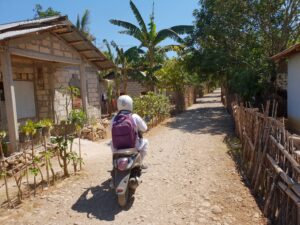
Doctor Fidelis riding his motorcycle. Photo by the author.
The next day when I met Fidelis, I did not mention what the older woman had confided in me. However, he was aware of the stereotypes held towards East Timorese residents in the area. He remarked, “I try my best to serve both communities equally, but I can’t meet everyone’s needs. I just stay focused and show through my work, my contribution to society.” As of writing, Fidelis continues to lead the Lansia clinic, conducting home visits to hard-to-reach areas in Kupang on his motorcycle. Despite his efforts, his monthly outreach activities still see limited attendance from his older East Timorese patients.
References
Hetz, Heidi. 2021. “The Concept of the ‘Good Refugee’ in Cambodian and Hazara Refugee Narratives and Self-Representation.” Journal of Refugee Studies 35 (2): 874-892.
Holmes, Seth, Ernesto Castañeda, Jeremy Geeraert, et al. 2021. “Deservingness: migration and health in social context.” BMJ Global Health 2021, 1-5;
Nguyen, Vinh. 2019. “Refugeetude: When Does a Refugee Stop Being a Refugee?” Social Text 139, 109–131.
Sakti, Victoria K. 2022. “Ageing at the margins: gendered and southern narratives of displacement among the East Timorese in Indonesia.” Journal of Ethnic and Migration Studies 49(4).
Victoria Kumala Sakti is a postdoctoral research fellow at the Max Planck Research Group “Aging in a Time of Mobility” of the Max Planck Institute for the Study of Religious and Ethnic Diversity. Her research focuses on aging and displacement, and their intersections with issues of care, memory, and post-conflict recovery. Victoria has conducted extensive ethnographic research in Timor-Leste and Indonesia, with more recent work focusing on urban aging and migration. She is the co-editor (alongside M. Amrith and D. Sampaio) of the volume titled Aspiring in Later Life: Movements Across Time, Space, and Generations (Rutgers University Press, 2023), and of a Special Issue on the extended temporalities of forced migration for the Journal of Intercultural Studies. She obtained her PhD at the Freie Universität Berlin in Social and Cultural Anthropology and studied Theory and Practice of Human Rights at the University of Essex in the United Kingdom, along with Psychology at the Atma Jaya Catholic University in Indonesia.
Cite as: Sakti, Victoria Kumala . 2024. “Who Cares for Older Refugees? An East Timorese Healthcare Worker’s Mission.” In “Aging Globally: Challenges and Possibilities of Growing Old in an Unsettling Era,” edited by Magdalena Zegarra Chiappori, American Ethnologist website, 7 August 2024. [https://americanethnologist.org/online-content/who-cares-for-older-refugees-an-east-timorese-healthcare-workers-missionby-victoria-kumala-sakti/]
